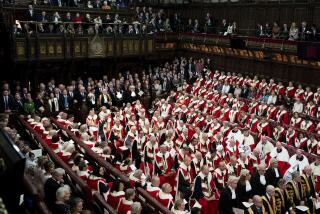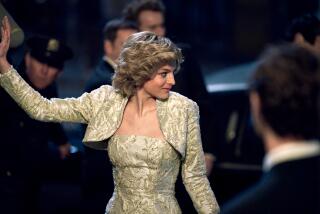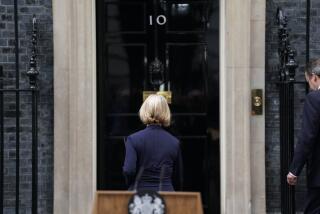Parliament: Great Show
- Share via
LONDON — The British Empire has faded to a scatter of Commonwealth countries, many with only a token obeisance to Old Blighty. The House of Commons no longer echoes to dissertations about India or the African colonies and the cast has changed radically.
Voices ring with discussions about drugs, insider trading, nuclear disarmament and incurable disease, problems never dreamed of by the colossi who once inhabited the celebrated chamber. Palmerston, Gladstone, Disraeli and Churchill are among ghosts in the Gothic piling under Big Ben.
Any one of those orators might have been struck dumb by the existence of a prime minister of the female persuasion, and sent into shock over problems as frightening as AIDS or nuclear war.
In a city of the world’s best and most prolific theater, Parliament remains its longest-running show, now in its ninth century and playing to full houses. All performances are matinees and tickets are not easy to get.
The best entree is to have a connection with a member. Next best is to have your congressman ask the U.S. Embassy to give you a pair of the four tickets allotted daily. These options failing, join the crowd for the afternoon sessions. Often this is the simplest and easiest way. As visitors leave the “strangers gallery,” others are admitted, and the ebb and flow may be in your favor.
On the left as one enters these hallowed precincts is Westminster Hall. The high-vaulted and wood-beamed cavern is one of Britain’s most historic structures, built by King William in 1097. Charles I was condemned to death there, as were the Earl of Essex, Sir Thomas More and that early-day terrorist Guy Fawkes.
Several kings abdicated or were deposed on this spot, and in later years it was a roaring marketplace. Now it is the site where royalty and celebrated statesmen such as Sir Winston Churchill lie in state.
Most of the surrounding buildings, including the House of Lords, were destroyed by fire in 1834. During World War II the structures took 12 hits from German bombers, almost obliterating the House of Commons. Restoration and cleaning has “tarted up” the complex considerably, but its Gothic design and rich air of tradition imbue it with an ancient ambiance.
In the Commons chamber the feeling is of deja vu . We remember that we’ve seen all this before in films: the muted light, richly carved woods, sloped galleries, stern attendants and sober-suited MPs on either side of the massive golden mace resting between members of the Government and the Opposition.
The Speaker, bewigged and in 18th-Century costume, is enthroned above his similarly garbed clerks near the center of the sanctum. He reigns supreme and must be above reproach, showing complete impartiality as presiding officer of the 635 members.
In heat of debate his voice cuts through others, shouting “Ordah! Ordah!”--not always successfully. But not all is formality and seriousness. In a recent ruling the Speaker stated that wimp is an unparliamentary expression, not to be used by one member to describe another.
Question Times are the liveliest hours, particularly on Tuesday and Thursday afternoons when the Tory prime minister, Margaret Thatcher, subjects herself to attacks of the Opposition. The “Iron Lady” is variously tough, scornful, incisive and patronizing as she parries thrusts that seek to embarrass her government or score a point.
Neil Kinnock for Labor and David Steel and David Owen of an Alliance coalition are dogged, articulate and adroit. Such exchanges are punctuated by roars of approval and outrage, not always softened by traditional references to “the right honorable lady” or “the honorable gentleman.”
Parliament has had several previous “right honorable ladies,” including the U.S.-born Lady Astor. Others were the snobbish Establishment lady who remarked after Labor’s 1945 landslide victory: “One is seeing a funny kind of person here lately.”
Another was Bessie Braddock, who ran into Churchill making unsteady progress along a corridor one day. “You are drunk ,” she said disdainfully. “And you, madam, are ugly,” he is said to have replied. “And in the morning I will be sober.”
It was Sir Thomas More who first obtained freedom of speech in the Commons from Henry VIII about 500 years ago. Since then this mother of parliaments has exported the principles and machinery of democratic government to the farthest corners of the world.
No legislative body has seen more drama and history, none is wealthier in tradition and ceremony or freer of expression. There is no admission charge and it remains one of the greatest shows on earth.
More to Read
The biggest entertainment stories
Get our big stories about Hollywood, film, television, music, arts, culture and more right in your inbox as soon as they publish.
You may occasionally receive promotional content from the Los Angeles Times.










